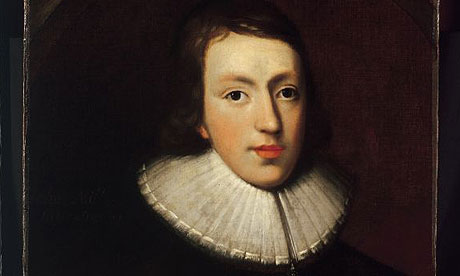
Okay I know that the modern definition of pandemonium is not the same as that of the Greek word and the name of the palace of the fallen angels in Paradise Lost, but I thought that was a funny and eye catching little title.
ANYHOOOO
After our discussion today in cultural history I was a little more attuned to the possible meaning of lines 670-700ish. The fallen angels decide to plunder a hill for its precious metals and minerals and build a giant palace-like structure. I was thinking that maybe this is referring to Spain's plunderous endeavours. We talked about Spain's mercantilistic thinking- they desired to attain as much of the $$metal$$ as po$$ible. Of course those wretched gold diggers were Catholic- which is not quite pleasing to our reformed Milton (just look at his portrait- he's not a label-lover by the way that he dresses, clearly reformed).
they desired to attain as much of the $$metal$$ as po$$ible. Of course those wretched gold diggers were Catholic- which is not quite pleasing to our reformed Milton (just look at his portrait- he's not a label-lover by the way that he dresses, clearly reformed).
Around line 690 we read that no one should "admire that riches grow in hell" and learn that "those who boast in mortal things" and some "greatest monuments of fame" are rejected by God. Is this an indirect slam at the Catholic Spain and its exploits?
 they desired to attain as much of the $$metal$$ as po$$ible. Of course those wretched gold diggers were Catholic- which is not quite pleasing to our reformed Milton (just look at his portrait- he's not a label-lover by the way that he dresses, clearly reformed).
they desired to attain as much of the $$metal$$ as po$$ible. Of course those wretched gold diggers were Catholic- which is not quite pleasing to our reformed Milton (just look at his portrait- he's not a label-lover by the way that he dresses, clearly reformed).Around line 690 we read that no one should "admire that riches grow in hell" and learn that "those who boast in mortal things" and some "greatest monuments of fame" are rejected by God. Is this an indirect slam at the Catholic Spain and its exploits?
As my good friend Rachel would say, "Humdinger."
